Bloomington councilmembers want to consider paying police more in 2022, ahead of collective bargaining negotiations
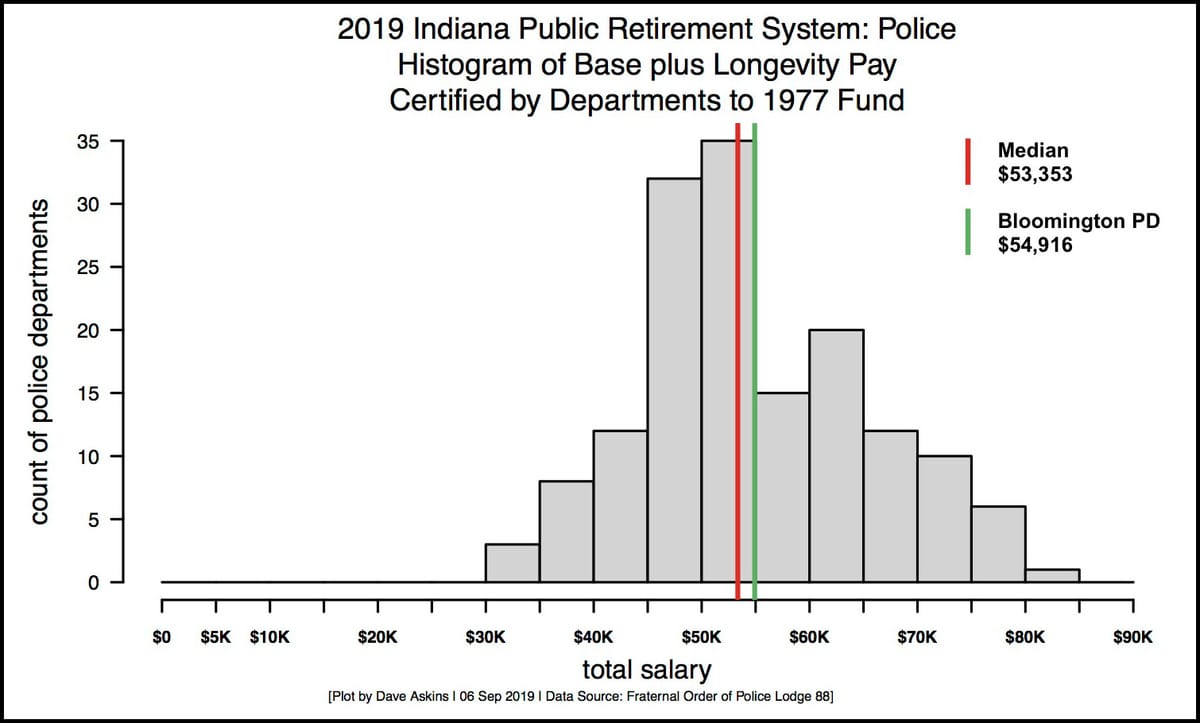
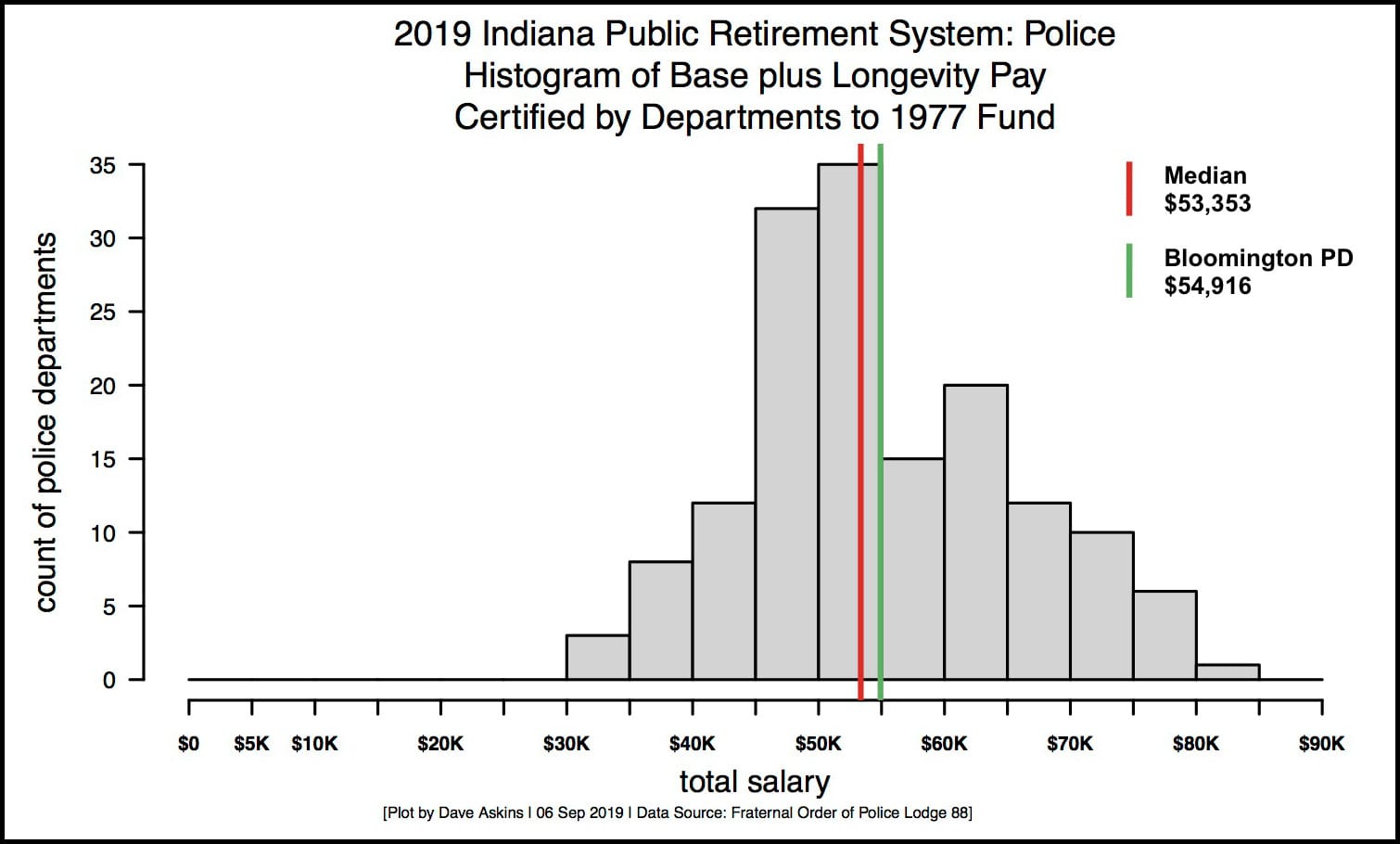
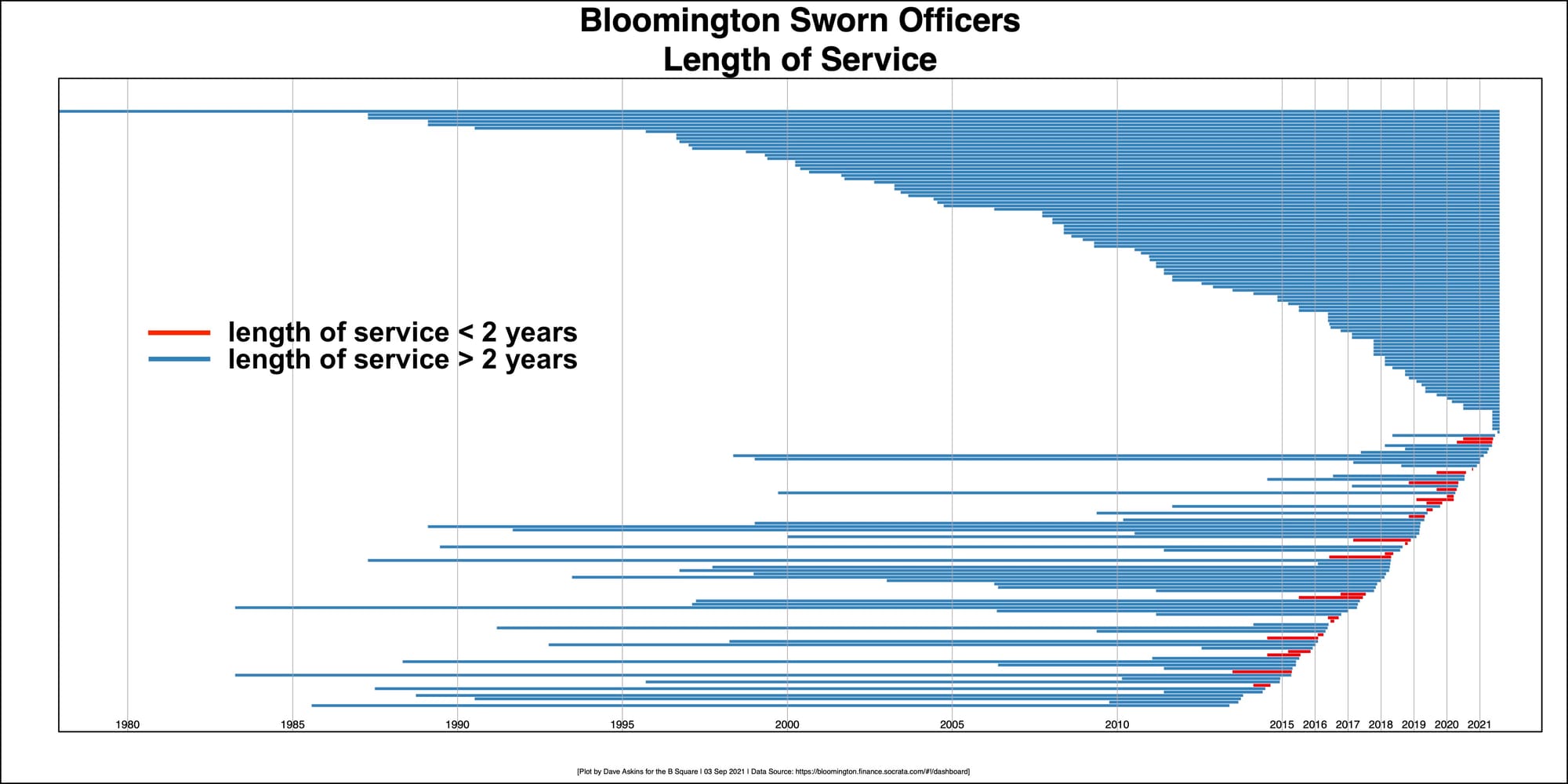
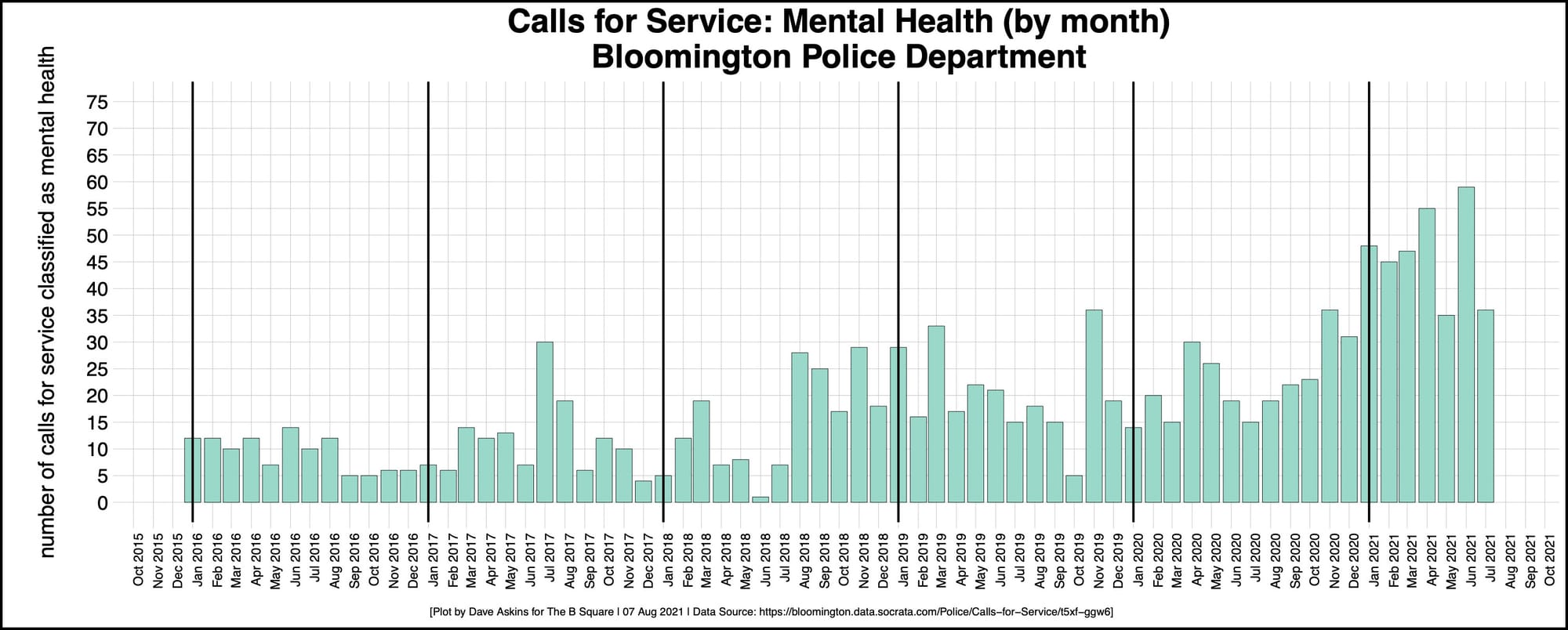
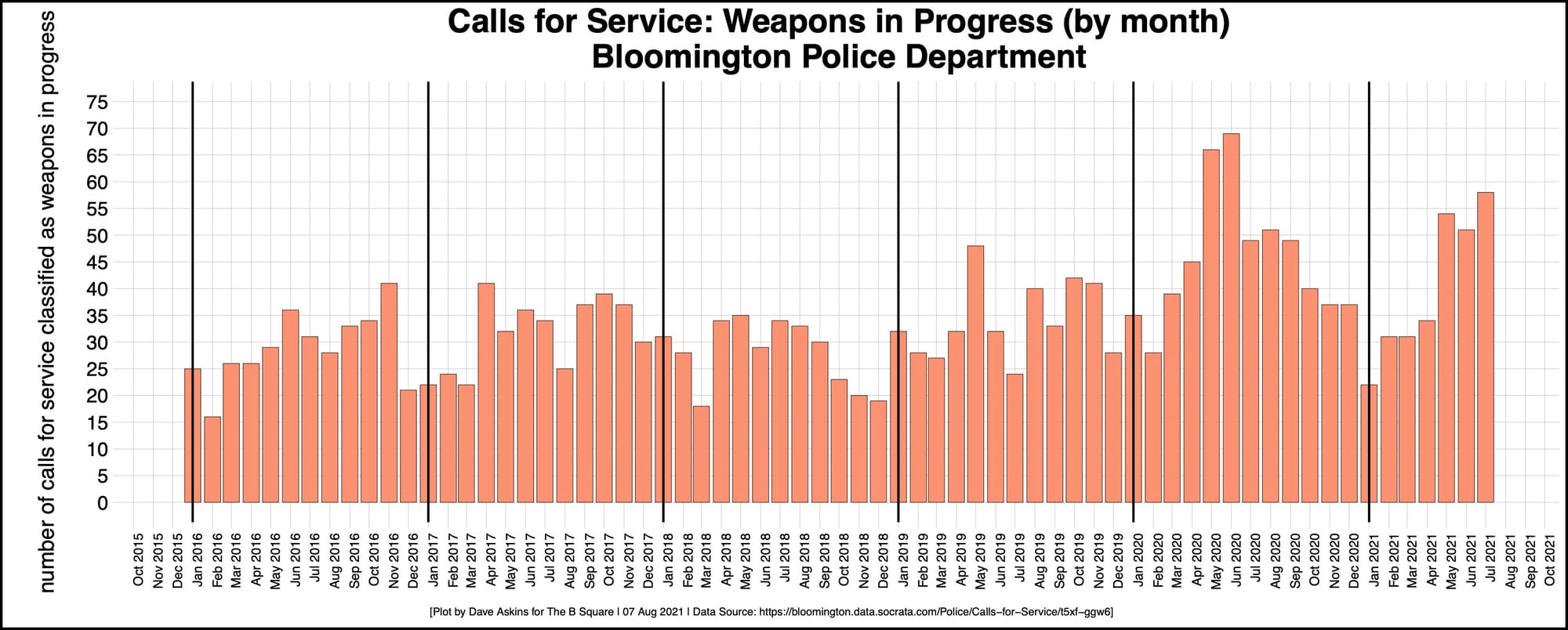
A majority of Bloomington city councilmembers sound like they would support paying the city’s police officers more than the amount specified in the current collective bargaining agreement, which runs through 2022.
That’s based on deliberations that took place Tuesday, the second of four nights of hearings by the council this week on each department’s proposed 2022 budget.
Councilmembers are worried that Bloomington’s pay is not competitive enough to recruit and retain officers to achieve the currently authorized staffing levels. That doesn’t factor in the roughly 30 officers called for by the fiscal plan that’s a part of the city’s annexation proposal.
Bloomington’s police department is authorized to hire up to 105 authorized sworn officers, but has just 93 on staff, of which only 76 are available, according to police chief Mike Diekhoff. The number who aren’t available to respond to calls includes those who are on military leave, on light duty due to injury, and also those still in training.
According to police union representatives, the department has hired 66 new officers but lost 67, since Hamilton became mayor in 2016.
The idea of re-opening the collective bargaining agreement in a limited way looks like it has support from FOP Lodge 88, the union representing the city’s sworn officers.
Responding to an emailed question from The B Square, Paul Post, president of FOP Lodge 88, wrote: “The FOP has been continuously asking for salary help to be competitive in hiring. We would certainly be open to a limited, narrowly focused re-opening of the CBA for such a purpose.”
The current collective bargaining agreement runs through 2022. It’s not yet clear if Bloomington mayor John Hamilton would be on board with an earlier contract re-opening. The 2022 budget includes a pool of $250,000 that is supposed to be used for recruitment and retention of police officers.
Table: Base Bloomington police pay from contract ratified in December 2019
| YEAR | PCT increase from previous year | Salary |
| 2018 | $52,916 | |
| 2019 | 0.0200 | $53,974 |
| 2020 | 0.0265 | $55,405 |
| 2021 | 0.0280 | $56,956 |
| 2022 | 0.0290 | $58,608 |
It was hard-fought negotiations that finally resulted in a deal at the end of 2019—which meant officers were working under the “evergreen” clause of their previous contract. Police officers attended several city council meetings that year in support of their cause.
On Tuesday, at-large city councilmember Susan Sandberg described the evolution of her thinking on the topic of police staffing.
“We heard from the FOP leadership [in 2019] that there were problems in the Bloomington police department, surrounding recruiting and training, and concerns over salaries,” Sandberg said. She continued, “So at that point, I kind of got the feeling, maybe this ship was sinking a little bit.”
Sandberg now perceives the situation to be dire: “But I will tell you, after three years—of observing, ride-alongs, talking to the rank-and-file officers—I think that ship is now on fire.”
Sandberg helped sponsor last year’s largely symbolic amendment to the salary ordinance, which was passed when the council adopted the 2021 budget in October. The amendment increased the number of authorized sworn officers from 100 to 105, even though it did not provide funding for those additional five positions.
Sandberg’s amendment last year, bumping the number of sworn officers from 100 to 105, was approved over dissent from Matt Flaherty, Kate Rosenbarger and Isabel Piedmont-Smith. Steve Volan was absent for the October vote on the 2021 budget.
The idea of increasing the pay of those sworn officers who are on staff sounds like it could have some traction—even among those councilmembers who don’t necessarily support an approach to public safety that relies on increased numbers of sworn officers.
Flaherty said on Tuesday, “I’m hearing a lot of comments that sort of assume public safety means police. And I just don’t agree with that as a fundamental premise—from a political and community value standpoint.”
About the idea of increasing pay, Flaherty added, “But going back to the compensation piece, I’m open to this. And I think it’s an interesting conversation.”
Piedmont-Smith said, “It has become increasingly clear to me that the salaries are inadequate, and this is a problem. … I do think we need to fix them earlier than next year’s contract negotiations.”
Rosenbarger said, “If we really are ranked 68th [of Indiana cities for police pay] … I think that’s just not at all competitive.” About Bloomington’s cost of living, Rosenbarger said, “This is a great place to live, but it’s also a really expensive place to live. So being so low in salaries, makes a lot of sense that folks aren’t choosing to work here.”
The ranking of Bloomington’s police department salaries against other cities in Indiana is based on the numbers that are certified to the state’s police and fire pension fund. At the time of the 2019 collective bargaining negotiations, Bloomington was 66th on the list of salaries certified to the pension fund. That’s about what FOP is reporting for the current figures.
Councilmembers indicated on Tuesday they wanted apples-to-apples comparisons for peer communities. They wanted to see police compensation levels for cities of similar size, with a college, and with a department that is certified by the Commission on Accreditation for Law Enforcement Agencies (CALEA).
Table: Police Departments in Indiana Certified by CALEA
**Bloomington’s 174 total includes non-sworn and sworn staff alike. Other departments might include only sworn personnel.
| Department | City | Total Staff |
| Bloomington PD | Bloomington, IN | 174** |
| Carmel PD | Carmel, IN | 146 |
| Columbus PD | Columbus, IN | 96 |
| Evansville PD | Evansville, IN | 319 |
| Fishers PD | Fishers, IN | 108 |
| Indianapolis Metropolitan PD | Indianapolis, IN | 1,894 |
| Kokomo PD | Kokomo, IN | 123 |
| Munster PD | Munster, IN | 47 |
| Noblesville PD | Noblesville, IN | 92 |
| Schererville PD | Schererville, IN | 70 |
| Shelbyville PD | Shelbyville, IN | 63 |
| Speedway PD | Speedway, IN | 50 |
| Valparaiso PD | Valparasio, IN | 65 |
| Westfield PD | Westfield, IN | 58 |
A measure of whether a police department’s compensation is competitive is how many applicants a department gets for open positions, according to Jeff Rodgers, a BPD detective and union representative who spoke on Tuesday during public commentary.
Rodgers described a recent BPD hiring process: 12 positions were open and 29 people applied. That compared with a hiring process in Noblesville at the end of July, where 189 people applied. Rodgers accounted for the difference by pointing to compensation. Noblesville officers are paid $12,000 more than Bloomington officers, he said.
“We have shown you all the numbers before. We can show you again. BPD is not competitive in salary or any other compensation,” Rodgers said.
About the large number of hires balanced against a similar number of departures from Bloomington’s police department, councilmember Sue Sgambelluri said the number of hires implied a growing police force. ”In reality, we’ve barely been treading water,” she said.
On Tuesday, councilmember Dave Rollo pushed for more pay for police in the 2022 budget. Rollo said, “Bloomington deserves the best services, the best roads, the best water quality and the best public safety. You get what you pay for.”
Rollo put a specific number on a raise: “I think that we ought to increase base pay by $5,000 immediately. That’s what I expect to see in this budget, if I’m going to support it in the future.”
The final 2022 budget will be presented by Hamilton to the city council in late September, with a vote on adoption set for October. Budget hearings continue on Wednesday and Thursday starting at 6 p.m.





Comments ()